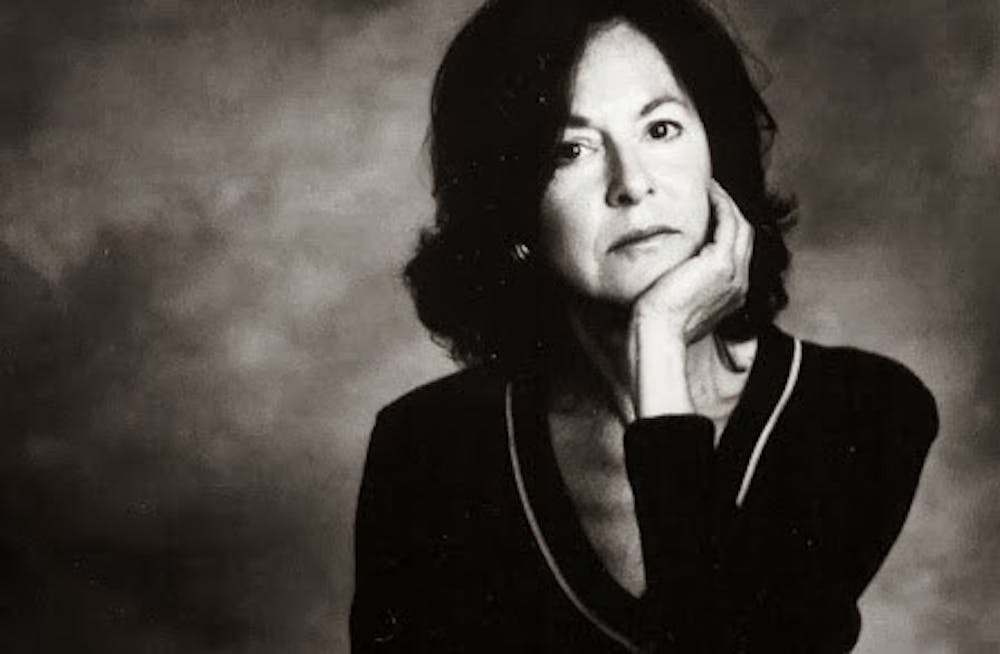Nastacia Voisin |
From the secret life of earthworms to the sensual joy of eating apricot jam, former U.S. Poet Laureate Louise Glück crafts poems that come from the heart and whisper blunt realities in her readers’ ears.
Glück (rhymes with click) will lecture tonight as part of the Schoenfeldt Distinguished Writers Series. Since its founding in 1988 by Rev. Arthur Schoenfeldt, C.S.C., UP’s Writers Series has featured notable authors biannually, with events that are free and open to the public. Glück's visit to UP cost "in the five figures" and was funded entirely by the Schoenfeldt Series, according to English professor John Orr. The Series is celebrating its 25th anniversary this year.
Orr, who selects the Writers Series lecturers with Portland Magazine editor Brian Doyle, admits he has “a little bit of hero-worship” for Glück.
“I like how she’s absolutely unsentimental,” Orr said. “She is not afraid. She wants to demystify things. I admire that – that ability to look at something as it is, and not as we’d like to think it is.”
With over ten books of poetry published and numerous honors to her name, Glück is saluted as one of America’s great contemporary poets. Born in New York, Glück, now 69, was named United States poet laureate in 2003, a title that recognized her as the nation’s official poet.
The emotional intensity and technical precision of Glück’s writing has won her the admiration of critics and poets, including English professor Herman Asarnow.
“She’s one of the best poets in America,” Asarnow said. “She’s not a Disney poet. She’s not reflexively anything. She’s very realistic.”
According to Asarnow, much of Glück’s poetry describes the experience of life with an academic clarity that strikes readers as cool or sorrowful. Her forte is using simple imagery that becomes meaningful through repeated use across her poems.
“Poets think and see – like all artists they notice what we forget, or never saw in the first place,” Asarnow said.
Sophomore English major Rachel Macklin noted the power of layered meaning when she read Glück’s book, “A Village Life” for Asarnow’s poetry workshop course.
“I sat down and read it all the way through,” Macklin said. “I thought it was absolutely stunning. You’re struck by the complexity she gives these very simple ideas.”
Macklin also noted a strand of darkness in all the poems.
“When you’re reading you get this sense of melancholy– like it’s always cloudy outside,” Macklin said.
Asarnow agreed that Glück’s writing is a little grim.
“I think she rightly sees living the human life as difficult, imprecise, and that the processes of nature can be reassuring as well as threatening,” Asarnow said. “She’s trying to articulate what it’s like to live that way.”
Asarnow and Orr speculate that Glück will read from her most recent work “Poems 1962-2012” as well as from “A Village Life.” As intimidating as her poetry sounds, Orr invites those unfamiliar with poetry to experience Glück’s lecture and discussion session.
“I think poetry, like any great art, is an opportunity to experience what is means to be a human being,” Orr said. “That’s part of an educational experience. As simplistic as that sounds, isn’t that the point? To help us understand who we are? Her poetry is able to do that.”
***
The lecture is Thursday, Feb. 13 at 7 p.m. in the Buckley Center Auditorium.
In addition to the lecture, Glück will also be holding a Q-and-A session Thursday from 2:30 – 3:30 p.m. in Buckley Center 163 to speak with students.








